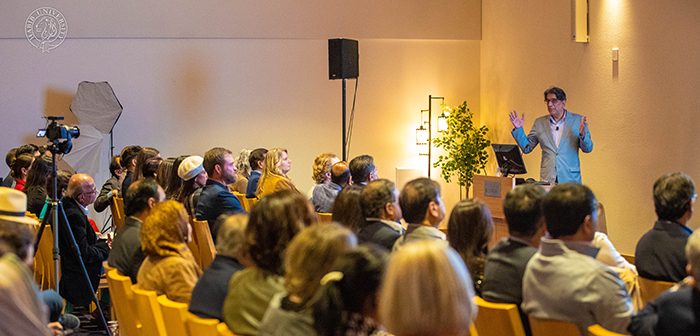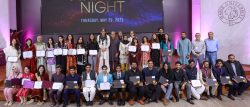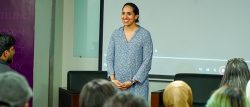Habib University hosted a significant event at Stanford University, moderated by Stanford’s academic leaders Sarah Stein Greenberg, the Executive Director of the d.school, and Dr. Alexander Key, an Associate Professor of Comparative Literature, both celebrated members of Habib University’s Board of Governors. The occasion honored the remarkable contributions of the Dhanani and Jeewanjee families, highlighting their significant roles. These families exemplify the rich tradition of US philanthropy, showing how supporting higher education can be a powerful force for global change.
An exemplary model of sustainability is Habib University’s community co-ownership approach. Recognizing the longstanding tradition of disempowerment in quality higher education, the institution advocates for change by inspiring visionary community leaders to reshape their philanthropy. Through collaboration, Habib University actively breaks down barriers to access, fostering a sense of shared responsibility for the future of higher education in Pakistan.
The event unfolded with Professor Sarah Stein Greenberg, Director of the Stanford D. School, setting the stage. President Wasif A. Rizvi of Habib University then took the floor, dedicating the event to the two esteemed community members, Zain Jeewanjee and Shaukat Dhanani.
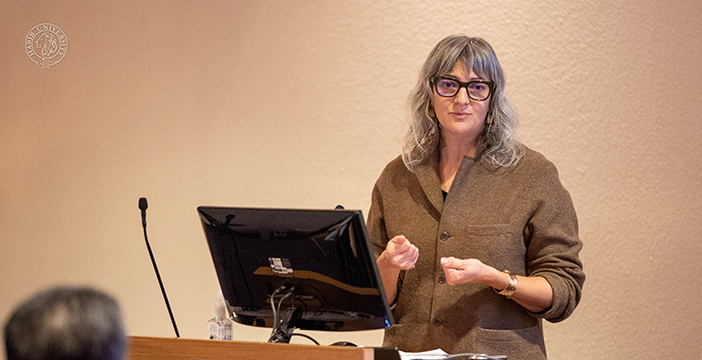
“Habib University paves the way for inclusive education, ensuring equal access to knowledge and opportunities across Pakistan,” said Sarah Stein Greenberg, Executive Director, Stanford d.School and Board of Governors at Habib University in her opening remarks at the “Transformative Gifts: Creating Legacies,” introducing the institution to gathered guests.
During the event, Habib University’s President Wasif A. Rizvi talked about solving the crisis of higher education in Pakistan and recognized that addressing these problems is akin to slaying a two-headed dragon. “In solving the Sudoku of higher education in Pakistan, we crafted a world-class academic framework that’s globally celebrated. We also established the world’s most generous University, ensuring accessibility for students from all backgrounds,” said President Wasif Rizvi while addressing the audience.
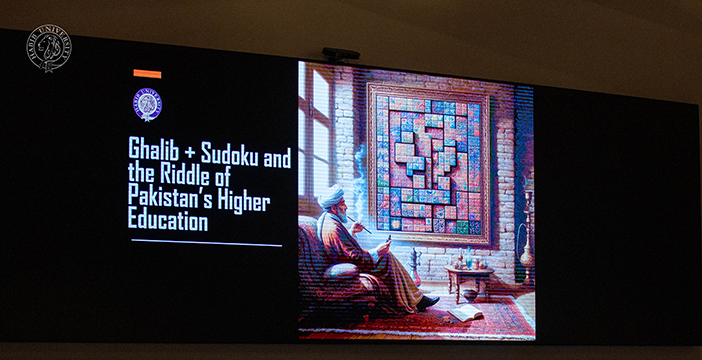
“Only 1.96% of Pakistani high school students graduate from international recognized boards… this same 1.96% represents 95% of the top university student populace,” said President Rizvi, further elaborating on the riddle of higher education in Pakistan.
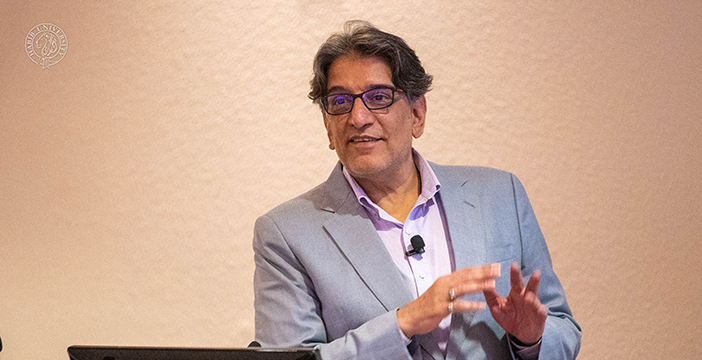
In acknowledging this influential model, Habib University has undertaken a mission to generate awareness and solicit endowments, particularly those of an intellectual nature. President Rizvi passionately articulated how intellectual endowments not only add financial stability to institutions but, more importantly, serve to fortify the university’s intellectual fabric. Such endowments contribute to retaining top-tier faculty, attracting leading scholars, creating platforms for dialogue and discourse, and promoting research and innovation.
The ensuing panel discussion featured Mr. Dhanani, Mr. Jeewanjee and Dr. Alexander Key. The discourse centered on profound ideas and insights regarding transformative philanthropic contributions and the creation of enduring legacies. The event, a blend of diverse perspectives, illuminated the transformative power of philanthropy in higher education.
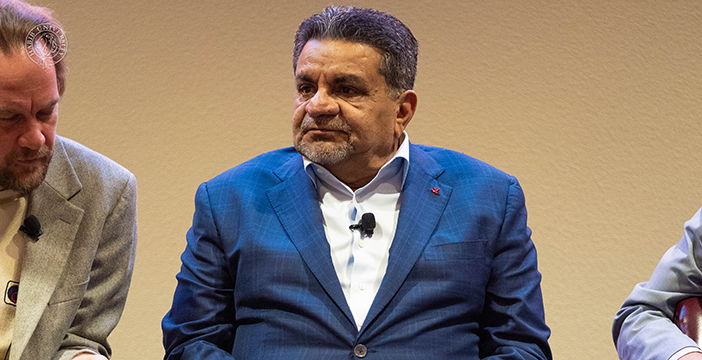
“Even though we’re far from Pakistan, our commitment remained strong through philanthropic efforts. The inspiring stories about higher education in Pakistan convinced us to expand our investments in this crucial area,” reckoned Mr. Dhanani, emphasizing the transformative impact of educational philanthropy.
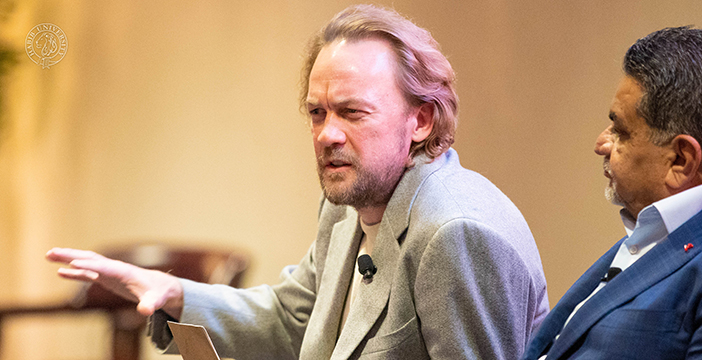 “Comparing the early challenges of Stanford’s establishment to the present, Habib University, in a remarkably short time, has surpassed us. My interactions with colleagues at Habib University revealed their faculty’s superior performance. The Liberal Core at Habib is more intellectually exciting, organized, and rigorous than our program at Stanford,” shares Dr. Alexander Key, expressing admiration and acknowledgment for the Liberal Core at Habib University.
“Comparing the early challenges of Stanford’s establishment to the present, Habib University, in a remarkably short time, has surpassed us. My interactions with colleagues at Habib University revealed their faculty’s superior performance. The Liberal Core at Habib is more intellectually exciting, organized, and rigorous than our program at Stanford,” shares Dr. Alexander Key, expressing admiration and acknowledgment for the Liberal Core at Habib University.
While numerous parallels exist between Stanford University and Habib University, the most profound is the commitment to making education accessible to all, regardless of social class. Habib University draws continuous inspiration from the culture of US philanthropy, where community support fosters imagination, innovation, and robust relationships.
Habib University demonstrates unwavering support by covering over 85% of its students’ expenses. Remarkably, in the entire history of Habib University, not a single student has dropped out due to financial constraints. This steadfast commitment underscores our dedication to ensuring accessible education for all.
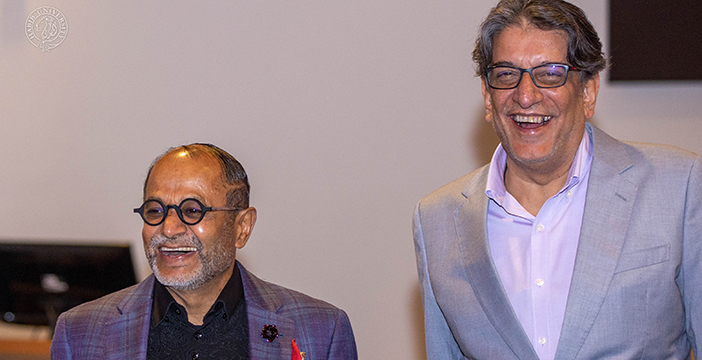 “Elevating higher education in Pakistan requires increased investments. I wholeheartedly urge everyone to explore the inspiring educational landscape at Habib University,” said Mr. Jeewanjee expressing his firm commitment that the firsthand exposure to Habib University’s educational setting will serve as a compelling reason for individuals to contribute to the advancement of higher education in Pakistan.
“Elevating higher education in Pakistan requires increased investments. I wholeheartedly urge everyone to explore the inspiring educational landscape at Habib University,” said Mr. Jeewanjee expressing his firm commitment that the firsthand exposure to Habib University’s educational setting will serve as a compelling reason for individuals to contribute to the advancement of higher education in Pakistan.
The collaboration between Habib University and Stanford University represents a shared commitment to fostering academic excellence, knowledge dissemination, and the development of well-rounded individuals equipped for the challenges of the future. This partnership extends beyond the geographical boundaries of the institutions, emphasizing the global importance of collaborative efforts in advancing higher education. The shared values and mutual dedication to transformative education make this event a reflection of the strong bond between Stanford and Habib University, exemplifying the potential of international collaborations in shaping the future of higher education.
Habib University has been exceptionally fortunate to draw the support of forward-thinking American philanthropists, notably Mr. Shaukat Dhanani and Mr. Zain Jeewanjee. Their substantial contributions have endowed the institution with vital intellectual assets: the Dhanani School of Science & Engineering and the Imam Ali Chair of Wisdom and Humanities at Habib University, respectively.
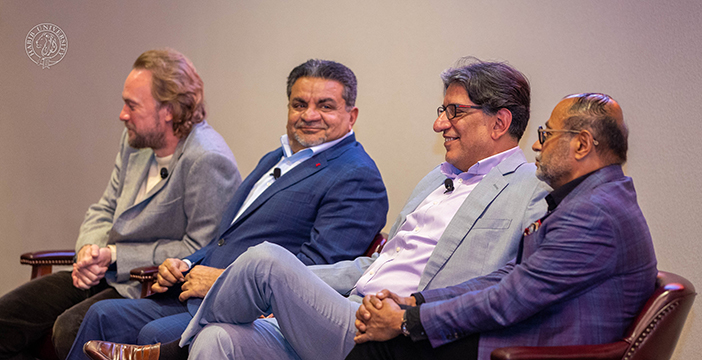 Habib University, through its unwavering commitment, is actively redefining the higher education landscape in Pakistan. Addressing the core challenges of intellectual, accessibility, and sustainability, the institution adopts a reparative approach rooted in historical understanding and discourses around arts, culture, humanities, religion, and diversity.
Habib University, through its unwavering commitment, is actively redefining the higher education landscape in Pakistan. Addressing the core challenges of intellectual, accessibility, and sustainability, the institution adopts a reparative approach rooted in historical understanding and discourses around arts, culture, humanities, religion, and diversity.
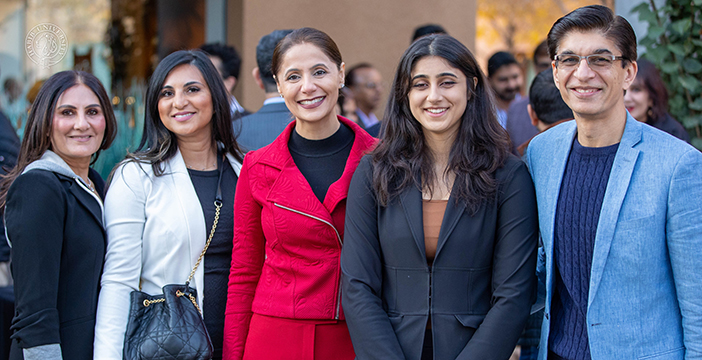
The event served as a testament to the transformative journey embarked upon by Habib University. It showcased the institution’s commitment to excellence, accessibility, and sustainability, with a focus on community co-ownership. The celebration of Zain Jeewanjee and Shaukat Dhanani symbolized the collaborative spirit that is driving positive change in Pakistan’s higher education landscape. As we reflect on this event, it becomes clear that the seeds of transformative philanthropy have been sown, laying the foundation for enduring legacies and a brighter future for higher education in the country.

